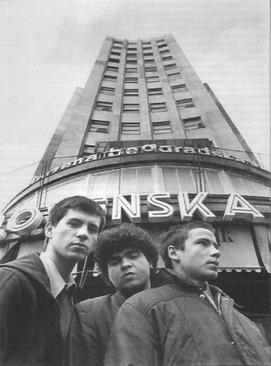Music of the world: Novi Talas – The New Wave movement in Yugoslavia
In the late 1970s, bands such as The Cure, Talking Heads and Joy Division were taking the world by storm and kick-started a musical movement that went on to be known as ‘new wave’. It was a movement that took classical punk music of the 70s and experimented with electronic, funk and disco. The Western world wasn’t the only proprietor of new wave music though. Nestled in the corner of South-Eastern Europe, a concurrent movement was forming in the unlikely location of Socialist Yugoslavia. The movement was very short-lived: lasting only from 1980 to around 1984 – but in those four short years, it had a profound impact on the music scene in Yugoslavia.
Due to its position as a Non-Aligned state, Yugoslavia had always been open to Western influences which allowed it develop a vibrant music scene, with prominent hard rock acts such as Bijelo Dugme (White Button), Riblja Corba (Fish Soup) and Divlije Jagode (Wild Strawberries) dominating the charts. The decline of hard rock in Yugoslavia coincided with the rise of punk music in the West and it was these punk artists such as Iggy Pop and the Stranglers that many Yugoslav bands took inspiration from. This creative licence was greatly extended after the death of Yugoslavia’s leader, Josip Broz Tito, on 4 May 1980 and the subsequent political and economic instability fuelled much of the movement. Yugoslav youth saw new wave music as a means to express their frustrations with Socialism and the general state of Yugoslavia in the 1980s.
No band acted as a voice of the disenfranchised youth better than the band Idoli (Idols). Their 1981 two-tone hit ‘Maljciki’ (Russian for ‘’Boys’’) served as a criticism of the Soviet Union in the form of a parody. The lyrics describe the life of a Soviet worker with the sarcastic overtone painting a bleak picture. In the middle of the song, there is a stanza in Russian to further accentuate the song’s connection with Stalinism, despite the fact it makes no sense and lead singer and writer Vlada Divljan could not understand it himself. Idoli are also credited with releasing the first Yugoslavian song on homosexuality, titled ‘’Retko te viđam sa devojkama’’ (I Rarely See You With Girls). The song tells the story of a man who shows very little interest in girls whilst it is alluded to that he is attracted to men instead.
This was significant as at the time homosexuality in most of Yugoslavia, including Serbia were the song was released, was still illegal and it remained that way until the 1990s. In 1982 the band released their debut full-length album called ‘’Odbrana i poslednji dani’’ (The Defence and the Last Days) which has on numerous occasions by music critics been voted as the greatest ever Yugoslav album.
The most influential act of the Yugoslav new wave scene, however, is largely considered to be ‘’Sarlo Akrobata’’ (Charlot the Acrobat). Only active for one year between 1980 and 1981, they released one album: Bistriji ili tuplji čovek biva kad… (Brighter or Dumber a Man Gets When…). Heavily influenced by the likes of XTC and the Stranglers, the band produced an eclectic infusion of punk, reggae and ska which redefined the Yugoslav musical landscape. Despite poor sales, the album achieved cult status and is widely considered to be one of the most important pieces of music to originate from Yugoslavia. It captured the attention of Western publications such as NME and Melody Maker who began praising the growing new wave scene in Yugoslavia, and artists such as British post-punk outfit Gang of Four who performed with Sarlo Akrobata in Zagreb in 1981.
By 1984 the global new wave movement had fizzled out and in Yugoslavia, it was no different. Most bands either split up or steered their musical style towards classic rock. Idoli would go on to release two more albums both of which had a more mainstream sound. Sarlo Akrobata split up in 1981 due to creative differences between leader singer Milan Mladenovic and bassist Dusan Kojic, with the two going on to form new projects called Ekaterina Velika (Catherine the Great) and Disciplina Kicme (Backbone Discipline) respectively, both of which would go on to have monumental success. The country itself began descending into chaos, culminating in a bloody civil war fuelled by ethnic and religious hatred which led to the breakup of the country. Despite the horrors of the war, Yugoslavia should be remembered as a place of artistic freedom and expression, with the new wave movement at the forefront.

Comments (3)
Oh, by the way homosexuality was decriminalised in Slovenia, Croatia, Montenegro and the autonomous province of Vojvodina in 1977 – well over a decade prior to the time cited in the article which incorrectly states homosexuality was illegal until the 1990s. The other former republics followed suit after the collapse of the former SFRJ, so, Serbia in 1994, Macedonia in 1997 and BiH in 1998 🙂
Hi there! Idoli’s ‘Retko te viđam sa devojkama’ (1980) is considered the first Serbian song about male homosexuality. However, the first song to touch on homosexuality in the former SFRJ were via Croatian band Prljavo kazalište with the song “Neki dječaci” from their self-titled debut album in 1979, one year earlier.
With that said, Ivan Vdović, the Serbian drummer who drummed for both Šarlo Akrobata and Ekatarina Velika was the first person in the former SFRJ to be registered as HIV positive cira the 1980s, eventually succumbing to the disease on September 25, 1992. #PocivajUMiru